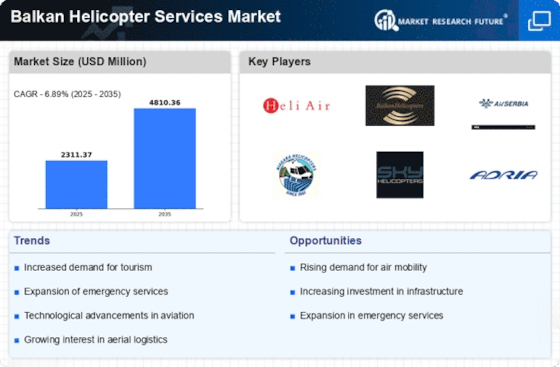Market Analysis
In-depth Analysis of Balkan Helicopter Services Market Industry Landscape
The dynamics of the Balkan Helicopter Services Market are influenced by a mix of factors reflecting the region's economic development, tourism industry, infrastructure needs, regulatory environment, and geopolitical stability. Helicopter services play a crucial role in the Balkan region, providing aerial transportation solutions for a wide range of applications, including tourism, emergency medical services, search and rescue operations, offshore oil and gas support, VIP transport, and aerial work missions.
One significant driver of the demand for helicopter services in the Balkans is the region's growing tourism industry. The Balkans boast a rich cultural heritage, stunning landscapes, and diverse attractions that attract millions of tourists annually. Helicopter tours, sightseeing flights, and aerial excursions offer visitors a unique perspective and unforgettable experiences, enabling them to explore remote destinations, historical landmarks, and natural wonders from the air. As tourism continues to expand in the Balkans, the demand for helicopter services for tourist transport, aerial photography, and leisure activities is expected to increase, driving market growth for helicopter operators.
Infrastructure development projects and remote access needs also contribute to the demand for helicopter services in the Balkans. The region's rugged terrain, mountainous landscapes, and limited road infrastructure present challenges for accessing remote and isolated areas. Helicopter services provide a vital lifeline for delivering supplies, conducting infrastructure inspections, and providing emergency medical evacuation services to communities located in hard-to-reach locations. Additionally, helicopters support construction projects, energy exploration, and maintenance operations in remote areas, facilitating economic development and resource extraction activities.
Technological advancements and fleet modernization efforts play a crucial role in shaping the dynamics of the Balkan helicopter services market. Helicopter operators invest in acquiring modern helicopters equipped with advanced avionics, navigation systems, safety features, and environmental controls to enhance operational efficiency, safety, and passenger comfort. Newer helicopter models offer improved performance, fuel efficiency, and mission capabilities, enabling operators to meet diverse customer requirements and regulatory standards while reducing operating costs and environmental impact.
Furthermore, regulatory frameworks and safety standards influence the dynamics of the Balkan helicopter services market. National aviation authorities, such as the Civil Aviation Directorate of the Republic of Serbia, the Civil Aviation Agency of Bosnia and Herzegovina, and the Civil Aviation Authority of Greece, regulate helicopter operations and set safety, licensing, and operational requirements for helicopter operators in the region. Compliance with regulatory standards and adherence to safety protocols are paramount for ensuring safe helicopter operations and maintaining public trust in helicopter services.
Moreover, economic factors such as government spending, tourism trends, and market competition impact the dynamics of the Balkan helicopter services market. Government investments in infrastructure development, tourism promotion, and emergency services support the growth of the helicopter services industry by creating demand for helicopter transport services and stimulating market activity. Additionally, market competition among helicopter operators, charter companies, and tour providers drives innovation, service differentiation, and price competitiveness in the Balkan helicopter services market, benefiting customers and driving market growth.
However, challenges exist in the Balkan helicopter services market, including airspace congestion, infrastructure limitations, regulatory compliance, and economic uncertainties. Airspace congestion and restricted airspace areas in the region pose challenges for helicopter operations, requiring coordination with air traffic control authorities and adherence to flight restrictions and procedures. Additionally, infrastructure limitations, such as helipad availability and ground support facilities, may constrain the expansion of helicopter services in some areas, requiring investments in infrastructure development and regulatory approvals to overcome.


















Leave a Comment